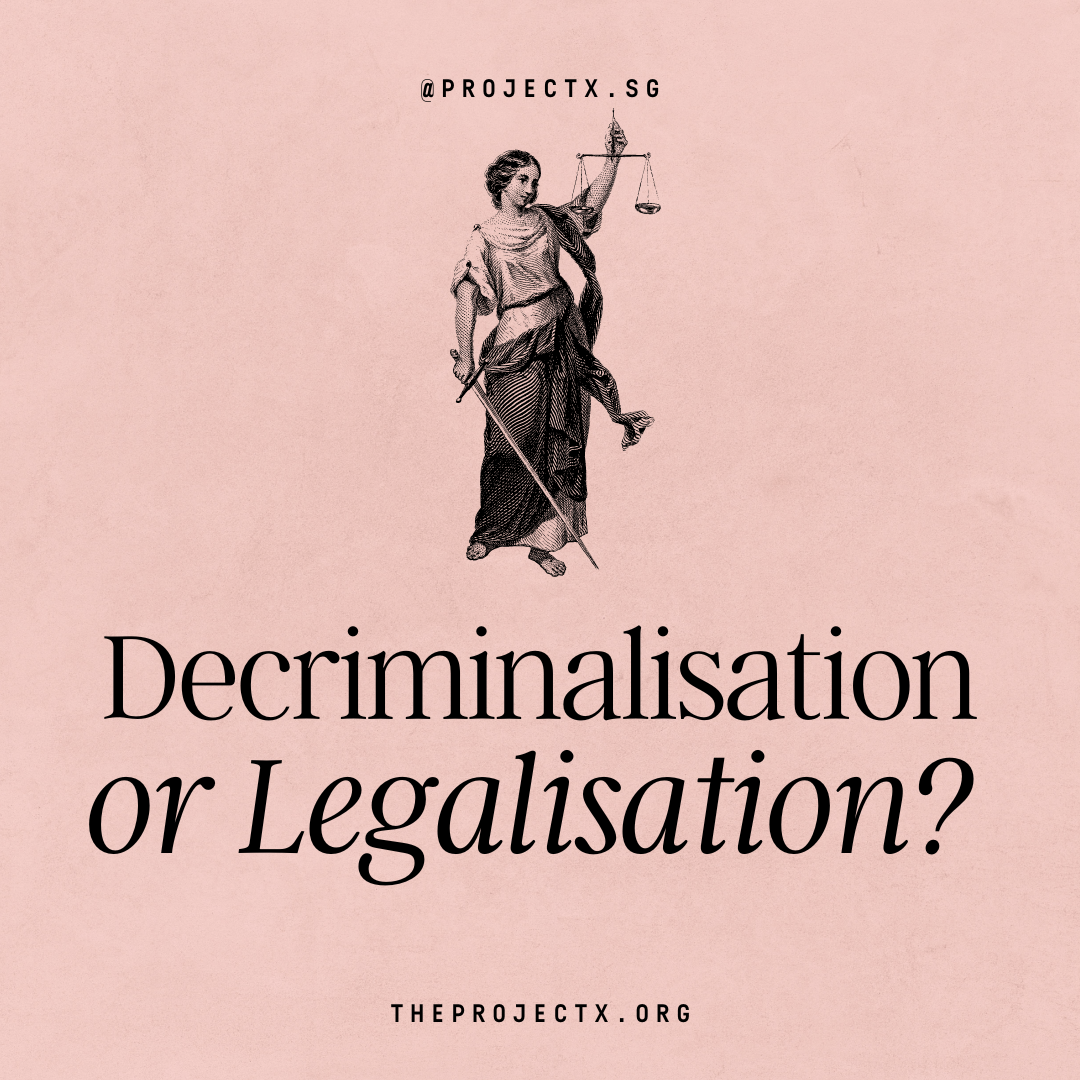In Singapore, certain aspects of sex work remain in the grey area, leaving those in the industry vulnerable to exploitation and abuse. In this blog post, we will delve into the specifics of legalising and decriminalising sex work in Singapore. We will also discuss what both can mean for the rights of sex workers.
Under current Singapore laws, certain aspects of sex work are offences. This includes soliciting in public, living off sex workers’ wages, managing a brothel, recruiting or hiring a woman for the purposes of sex work, and being a migrant sex worker. Those who are caught can face heavy fines and imprisonment, and also deportation. The law in Singapore allows some sex workers to work legally, but their ability to obtain customers safely is limited. Many sex workers operate underground and are vulnerable to exploitation and abuse.
Decriminalisation and legalisation are terms often used interchangeably, but they are distinct concepts that mean different things. What, then, do they mean respectively, and how do they look in practice?
According to the Global Network of Sex Work Projects (NSWP) (2020), decriminalisation refers to the “removal or absence of laws that outlaw and oppress sex workers”, while legalisation is defined as the “the introduction of laws that aim to impose state regulation and control sex work and sex workers” (p. 7). In short, decriminalisation omits, while legalisation regulates.
Currently, legal sex work in Singapore can be seen through regulated brothels at designated locations near Little India and Geylang. Brothel workers are allowed to operate indoors as long as they do not solicit publicly. Licences are issued to these brothels by the Specialised Crime Branch, stipulating that only those with a specialised work permit are allowed to engage in sex work. Monthly sexual health screening is made compulsory at the Department of Sexually Transmitted Infections (STI) Control Singapore; licensed sex workers are given “yellow cards”, medical mandates that pass one as “legal” before the eyes of the law.
The legalisation of sex work comes with many benefits. To elaborate, those under the “yellow card system” experience more ease when collecting payments, due in part to the protections accorded to them by the brothel managers as well as law enforcement. Such enhanced safeties also extend to instances where they are harassed or abused by customers. Additionally, sex workers with the “yellow card” are also more informed about their sexual health, owing to regular STI testing, which allows them to better understand the risks involved and ways to stay safe.
Legalisation, however, can also come with many terms and conditions that can make sex work difficult. Many argue that legalisation can mean strict regulations, such as fixed locations and working hours. There is also a possibility of having to adhere to advertising rules and regulations, which may impede their ability to earn and expose them to penalties should the rules be flouted. It is important to note here that “legal” sex work in Singapore is a viable option for only a small demographic of sex workers; unlicensed sex workers make up the majority of the industry because of the painfully stringent criteria for application. Only those between the ages of 21 to 35 years old, who are neither Malay, Muslim, nor ‘Male’ on their identification card, and from a list of approved countries (which are China, Malaysia, Vietnam and Thailand) are eligible.
Decriminalisation, on the other hand, would remove criminal penalties for sex workers, allowing them to access legal protections, health services, and other forms of support. It can also ease the fear of punishment or investigation when reporting exploitation or abuse. They would also have access to the police for crimes committed against them, while still utilising tried and tested methods to get more clients. One may note, however, that while decriminalisation contributes to the erosion of the stigma surrounding sex work and STIs, it does not eradicate it– a study by Abel and Fitzgerald (2010) reveals how stigma and discrimination fail to depart post-decriminalisation. Decriminalisation is not the metaphorical magic wand with which a sex worker’s problems can be wished away, but a step in the right direction.
When asked if she would prefer decriminalisation or legalisation of sex work, a sex worker’s response was “Decriminalisation definitely. I wouldn’t have to get threatened by customers that said they would report me for advertising online if I don’t give them free sex.” Mabel, a sex worker, also mentioned “Sex workers around the world working in various environments and legal conditions all agree that decriminalisation is the best and safest option for us. There should not be any legal sanctions at all for doing sex work or procuring a sex worker’s service.” Na, another sex worker mentioned “I’d still prefer sex work in Singapore to be in the grey area for the lack of rules and regulations. I don’t want to risk being stuck in a 10 m^2 room with a limit on the price over my head and paying exorbitant duties and taxes!”
Project X is a non-profit organisation championing the rights of sex workers. Before we get into the reasons why I advocate for decriminalisation over legalization, let’s hear from the people at Project X who inspire me to advocate for their rights. As mentioned by Wany, “People won’t feel the need to declare what they do and this reduces their fear of being outed”. Vanessa, the executive director of Project X said that “the police do not belong in our bedroom, and neither does MOM(Ministry of Manpower)”.
In my opinion, decriminalisation of sex work essentially removes the more salient criminal penalties associated with sex work, such as raids, arrests and deporation, which is ideal. However, the safety of sex workers isn’t necessarily guaranteed. For non-payment of services, even if a sex worker makes a report, it’s almost impossible for them to get back the money to be paid. The power differential between sex workers and their clientele is immense– there needs to be explicit legal protections against discrimination and abuse towards sex workers, and a structural bias that unwittingly insulates perpetrators from severe punishment.
Personally, it is important to prioritise the health, safety, and well-being of sex workers and ensure that they are not subjected to exploitation, or abuse, regardless of the approach taken. As such, I would prefer decriminalisation because it allows sex workers to work safely with access to services they may not have at this time. While the concept of the legalisation of sex work seems optimal initially, seeing as it implies a legal structure against which sex workers can be protected and their labour acknowledged as legitimate, it serves as a form of state control, one that can inflict more harm than good. Furthermore, it comes with regulations that could be detrimental to sex workers, such as the policing of certain bodies that do not fit into the legal framework for legalisation, or the restriction of alternative schedules or ways of conducting their labour. This would create more issues whereas decriminalisation would tangibly reduce the issues that sex workers currently face in their line of work, such as police raids, and arresting sex workers on indeterminate bases (like searching a sex worker for condoms as proof of solicitation).
While both approaches have their pros and cons, it is most crucial to prioritise the health, safety, and well-being of sex workers and ensure that they are not subjected to exploitation or abuse. It is important to listen to the voices of sex workers themselves and work towards creating a safe environment that benefits everyone involved.
Reference:
Abel, G., & Fitzgerald, L. (2010). Decriminalisation and stigma. In Taking the crime out of sex work. (pp. 239–258) https://doi.org/10.46692/9781847423351
Bacchi, U. (2018, December 11). Legalizing prostitution lowers violence and disease, report says. U.S.https://www.reuters.com/article/us-global-women-prostitution-idUSKBN1OA28N
Celine. (2017). Difference Between Legalization and Decriminalization | Difference Between. Difference Between. http://www.differencebetween.net/language/words-language/difference-between-legalization-and-decriminalization/#ixzz7xzVpqKSN
Laws on Procuring Sex Workers & Sexual Services in Singapore – SingaporeLegalAdvice.com. (2021, June 25). SingaporeLegalAdvice.com. https://singaporelegaladvice.com/law-articles/laws-procuring-sex-workers-sexual-services-singapore/






